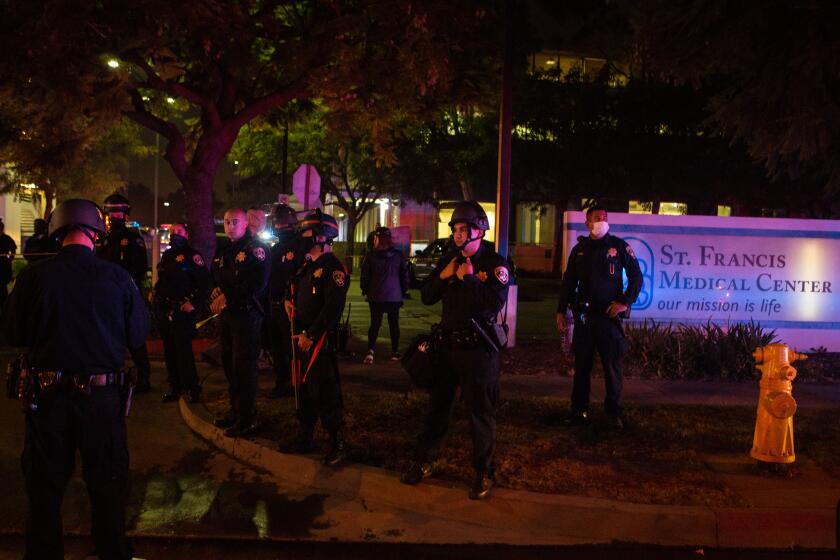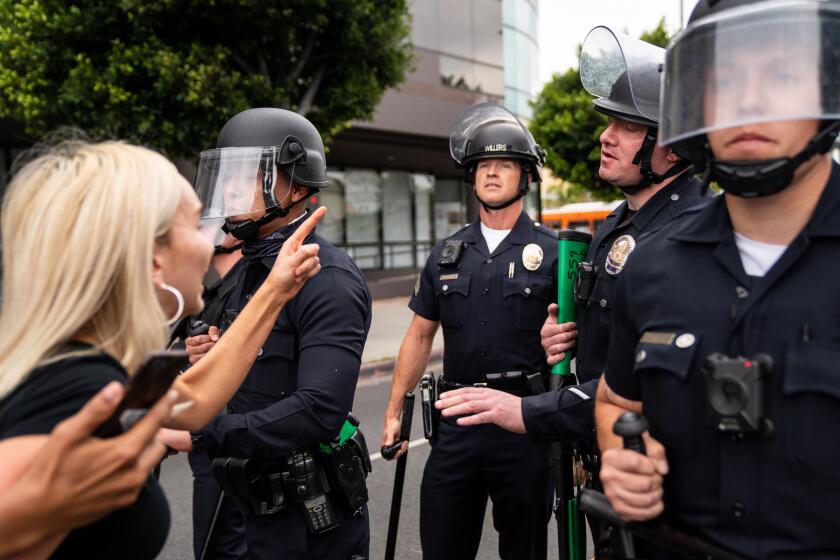Deputy deaths are a reminder that law enforcement can be lonely, traumatic work

- Share via
Warning: This editorial includes discussion of suicide.
A law enforcement officer’s job is difficult and dangerous and takes its toll on body, mind and spirit. A reminder of that cost came last week with the shocking and tragic deaths by suicide of four active and former Los Angeles County sheriff’s personnel within a 24-hour period.
Investigations are ongoing. The deceased reportedly include a retired sheriff’s sergeant, a custody assistant and two deputies. Altogether, there have been eight deaths by suicide among current and former Sheriff’s Department employees this year.
L.A. County Sheriff Robert Luna urged department employees to “check on the well-being of other colleagues and friends.”
Policing necessarily entails violence and trauma. Like all first responders, police officers and deputies experience human crises on a continuing basis and encounter grievous injury and death on a scale that’s difficult for those not in their profession to understand. Unlike other first responders, their work requires them to be prepared to exert deadly force. Society demands it of them and gives them the weapons, the training and the legal authority to do it.
The responsibility to exercise that power in a way that protects the innocent as well as themselves, and yet not physically harm perpetrators needlessly, is mind-boggling. The consequences of making a mistake can be fatal, and officers who survive an encounter that leaves a suspect dead can expect searing scrutiny, potentially an end to their career and even criminal prosecution.
Suicide prevention and crisis counseling resources
If you or someone you know is struggling with suicidal thoughts, seek help from a professional and call 9-8-8. The United States’ first nationwide three-digit mental health crisis hotline 988 will connect callers with trained mental health counselors. Text “HOME” to 741741 in the U.S. and Canada to reach the Crisis Text Line.
The ambush-style shooting of two Los Angeles County sheriff’s deputies was abhorrent — as were the words reportedly shouted outside the hospital where they were taken.
Law enforcement agencies are under constant criticism for use of excessive force, and rightly so. Police in the U.S. shoot approximately 1,000 people to death annually. Although a majority of those people are armed and dangerous, some are not and some may be dangerous because of noncriminal conditions like mental illness or substance use disorder. We have long asked police to respond to those problems with the tools we give them, although we know that in some cases other responders and other tools are more appropriate, including counselors and clinicians, housing, mental treatment, healthcare, education and job training.
The gap between what we demand of law enforcement and what officers are equipped, trained and suited to provide exacerbates a long-standing and growing estrangement between police and those whom they are sworn to protect and serve. That estrangement, added to the trauma inherent in the job and a machismo culture that too often sees seeking help as a sign of weakness, can create a combination that is unhealthy to those who serve. In a typical year, more police die by suicide than in encounters with suspects. Law enforcement officers have been found to die by suicide at a rate 54% higher than the rest of the population.
L.A.’s law enforcement agencies are among the nation’s most “reformed,” but they still engage in excessive force and other misconduct.
Beyond the stress and emotional injury that officers bear, they are further endangered by their ready access to firearms. Among Americans outside law enforcement, most suicide attempts are not fatal — except when a gun is used. Officer suicide attempts most often involve guns, and therefore are most often fatal.
Yet suicide rates differ among law enforcement agencies, so it is worthwhile to examine those where rates are lowest. Studies of the Los Angeles Police Department in the 1970s revealed lower rates than in comparable law enforcement departments, lower even than among L.A.’s general population. The LAPD was one of the first departments to make professional mental health services available to officers, and experts believe that was one of the factors in a lower suicide rate.
The Sheriff’s Department, like most large law enforcement agencies, now also offers its personnel free and confidential psychological counseling and other services, but it’s not clear that deputies are comfortable using it for fear of stigma. In the rest of society, there has been a growing awareness of the need for help in treating emotional wounds as well as their physical counterparts. That need is acute in law enforcement, and necessary for the health and safety of all of us.
More to Read
A cure for the common opinion
Get thought-provoking perspectives with our weekly newsletter.
You may occasionally receive promotional content from the Los Angeles Times.












